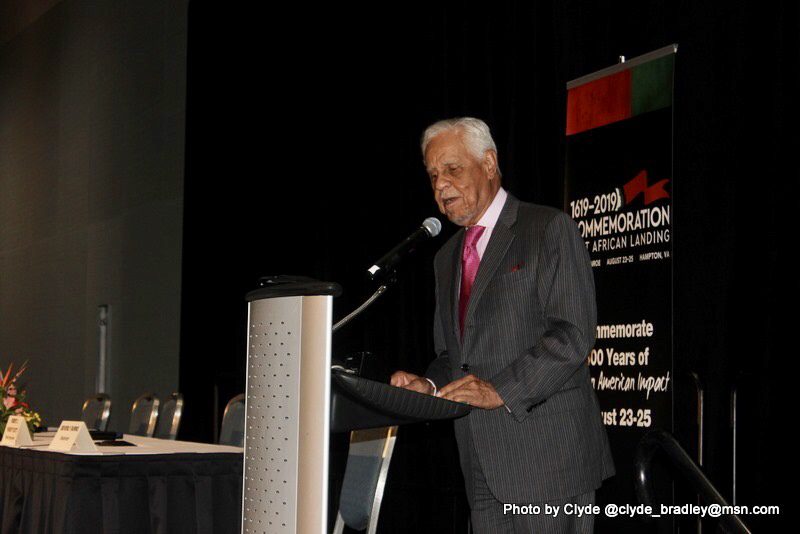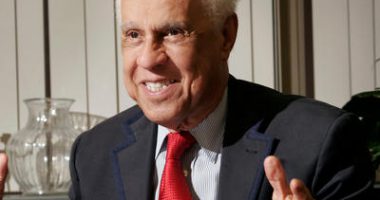The 400 year acknowledgment should spur us all to know our history as a nation; we should learn from the mistakes of the past and determine whether the present course of political participation produces a stream of competent and transparent leadership. We deserve leaders that are tireless in affecting change, and who are fervent in addressing the concerns and needs of the people.
My remarks delivered in Hampton, yesterday, can be read in their entirety below:
Excerpts of Remarks Made at the 1619-2019 Commemoration, Hampton, Virginia
Many thanks for the kind introduction, I welcome the opportunity to be with you today in Hampton. There is a need for America to know more of this historical place and what has been produced here, and the beat goes on.
In 2017, I was asked by the Jamestown-Yorktown officials charged with the commemoration of the 400th anniversary of Africans being brought to Point Comfort (Hampton), Virginia to take part. In addition to being asked to participate in several events, I was asked to be the honorary chair of the first Africans brought to English North America. I later learned that it was more ceremonial than actual. I hold no brief with any of those who chose another route but must confess I was surprised.
Foolishly, I thought that my being the grandson of slaves, and the first person of color to be elected as governor of any state in America, that I may have been able to show and speak to what slave conditions were and how direct descendants met with them. The events of 1619 inexorably shaped the history of America’s founding, and continue to ripple through to this very day.
The Jamestown/Yorktown commission had never in its history of years had a person of color to serve. I changed that as governor and also recognized the importance of having Native Americans to serve. If all you learn from this 400th anniversary is, “well, that was then, but this is now, look how we have progressed,” you are continuing the bastardization of history.
I remember some fifty years ago, I had just been elected to the senate of Virginia, the first such happening for a person of color since reconstruction, there was a call for the celebration of the 350-year event. Very close and personal friends of mine were organizers of the event. I was publicly critical and chose not to participate. I knew of the good intentions of the organizers, but felt that observing history is one thing, continuing to live in it is quite another.
They were still singing the state song across the Commonwealth, “Carry Me Back to Olde Virginny,” the ode is a slave’s lamentation to be brought back to old “massa” and “missus,” to join them, even in heaven, as their slave.
My first speech on the Senate floor brought an end to the singing of that song, which has subsequently been retired as “emeritus”. Coincidentally, I chose that to be the first chapter of my book, “Son of Virginia”.
For years the people were taught and led to believe that the problem of race was a “southern problem”.
I remember my years at VUU when returning veterans and others would constantly say to me, “how can people live in this segregation?” They were from Harlem, Detroit, Philadelphia, Chicago, New Jersey, Indiana, etc.
I soon came to know that race problems have always been America’s problems.
Each generation has the responsibility to commit to the improvement in the lives of its fellow citizens.
I looked about in 1964 and found that when the schools were shut down in our Commonwealth to keep “negroes” out, after the courts subsequently ruled that their action was unconstitutional, Virginia never put the compulsory school attendance law back on the books. I sponsored the legislation to put that law back on the books. I was joined in that regard by my friend, Senator Hunter B. Andrews of Hampton, who helped me draft the legislation.
While serving in the senate, a high school and college classmate of mine brought to my attention that sickle cell anemia, that blood disease that is particularly affecting, and detrimental to “negroes”, was not being funded for research in Virginia, nor were those persons so affected eligible for care under the state’s comprehensive health coverage. She was a technician in the state health program and helped me to push for the legislation enabling victims of sickle cell to be covered. Many people were unaware of the disease and its effects. I was able to get the necessary support because we made our case and our facts were there.
The opportunity came to have single-member districts in the Virginia house of delegates. this would allow for members not to have to be elected at-large (all of Norfolk, Richmond, Roanoke, etc.). I sponsored the legislation enabling an almost ready increase in minority representation.
As governor, I was able to craft a congressional seat from a district where a minority could be elected. Bobby Scott ran and was elected.
Sitting in my office, I was presented with a formal epaulet which the Air National Guard was required to wear on their uniforms. It was an insignia of the confederate flag. as the commander of the state’s National Guard, it only took a few moments to inquire from the general in charge as to whether that was true and then I corrected that by ordering them to be removed.
Though this sounds like bragging, and I am, I’m merely pointing out some of the things I saw the need to improve upon and where I did so. I didn’t wait and moan and say, “Well, I’ve got to wait for more help,” I did what I could do when I could.
Today there are so many things that can be done for the descendants of those 20 persons aboard that ship, things that can be done by some of those descendants.
The waste of money by school districts putting all the blame on taxpayers rather than sharing some of the blame for poor stewardship. Who is speaking in our communities to the disproportionate punishment and expulsion from schools of minority students across our nation? And why not?
No, I am not interested in kumbaya and reconciliation in celebration. I challenge you to tell me what there is that slaves or their descendants should reconcile? Liberty? Equality? Fairness? Recognition of the trail of neglect that slavery ushered in and left its negative deposits?
I am fortunate to have had the strength of family.
Both my father’s parents were slaves, he had sisters and brothers who were slaves. he, being the youngest in a family of 14, did not bear that yoke.
Today, there are things we should be doing to address the evils of slavery while not fighting the war again.
I think the times call for the continuing education of Americans, providing the true and accurate history of America.
This should be restarted in our homes and communities, taught in our public schools and universities, and prominently promulgated by the media.
The history of who we were and are, needs to be told. It has always been necessary; DuBois and Douglass knew that and knew the importance of education. The pioneers were not involved with the printing of news for sound bites, but for the true education of a people who had no voice, and for the most part, a government that did not represent them at national, state, and local levels.
A few years ago, I was approached by a Caucasian man who encouraged me to facilitate the establishment of the slavery museum. He said that his grandfather was a slave. I was startled. He further explained that he was originally an indentured servant but because of failure to pay off the indebtedness, He was imprisoned in Libby Jail, the detention place for slaves, and treated as a slave thereafter.
Little will be spoken of during these times of the poisonous air that engulfed the leaders of our nation when the Dred Scott decision was rendered in 1857.
Chief Justice Roger Tanney read from the 55-page opinion taking him almost two hours to finish it. Though Tanney is most identified as the author of the Dred Scott decision, it was a 7-2 decision and Justice Peter Daniel of Virginia was among the majority.
I will not linger upon the decision but would reference that which was said by the highest law of the land:
“They (African Americans) are not included, and were not intended to be included, under the word “citizens” in the constitution, and can therefore claim no right, none of the rights and privileges which that instrument provides for and secures to citizens of the United States. On the contrary, they were at that time (1787) considered as a subordinate and inferior class of beings, who had been subjugated by the dominant race, and whether emancipated or not, yet remained subject to their authority, and had no rights or privileges but such as those who held the power and the government might choose to grant them.”
The occasioning of this observation comes at a time when many are looking to rededicate our nation to the high-principled, but too-long ignored, precepts of the “Founding Fathers”. It could be described as the period in our nation’s history when we are all being called upon to form, frame, and deliver on that message.
The fact that three of the first four presidents or “Founding Fathers” were slave owners is never mentioned.
I have always believed when a thing is right the time is right.
Are we going to wait for the 450th observation or the 500th? And what then will be the goal?
I am optimistic about our future as a nation. I have great confidence in the people. but I believe we should continue to demand what is right and to criticize what is wrong.
I strongly believe that there is much more that unites the people of America than divides us and we can do the right thing. let’s do it.
Let us together know our history, learn and profit from it, and teach those who are unaware to pass on the true story of America and where it all began.








